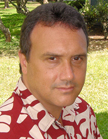
Dr. Kaholokula is a behavioral scientist, a State of Hawai‘i licensed psychologist, and chair of the Department of Native Hawaiian Health at the John A. Burns School of Medicine.
He has specialized in the area of Native Hawaiian health for over 12 years, both as a researcher and clinician. He has post-doctoral behavioral medicine training and clinical experience in the delivery of obesity interventions to Pacific Peoples. Likewise, he has expertise in quantitative and qualitative research methods, intervention outcomes research, CBPR, and obesity and diabetes issues in Pacific Peoples.
Dr. Kaholokula has served as an investigator for various NIH-funded projects, including the NCMHD-funded 3-Year Planning Phase and 5-Year Intervention Phase for the PILI ‘Ohana Project and the 5-year PILI @ Work Project.
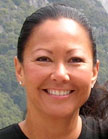
Dr. Sinclair is an Assistant Professor in the Department of Epidemiology at the University of Washington.
Her research focuses on eliminating cardiometabolic disparities of diabetes, obesity, and cardiovascular disease through intervention and epidemiological research. She worked for 10 years in the Office of Native American Diabetes Programs at the University of New Mexico where she culturally adapted and evaluated interventions and educational materials for diverse tribal groups and worked closely with the Indian Health Service National Diabetes Program and tribal governments.
Dr. Sinclair has tailored a diabetes self-management intervention for Pacific Peoples, and she is currently examining the spatial patterning and distribution of diabetes risk factors, prevalence, and incidence in a multiethnic cohort in Hawaii under a K01 award from the National Institute of Diabetes, Digestive, and Kidney Diseases.

Dr. Townsend-Ing is a public health professional with the Department of Native Hawaiian Health. As program coordinator, she works closely with both the community and academic partners to plan, coordinate and monitor daily operations of the PILI Ohana project.
Much of her training and work experience has been in health disparities, community-based participatory research, health behavior and health education.
She has worked with various community partners throughout O‘ahu, and recently strived to establish a state Physical Activity and Nutrition Coalition, which advocates for policy and environmental changes to improve Hawai‘i residents' physical activity levels and nutrition.
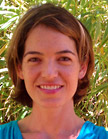
Dr. Delafield is a research coordinator with the Department of Native Hawaiian Health. She started working with the PILI ‘Ohana Project in 2011 as coordinator for the Office of Hawaiian Affairs grant that expands the PILI ‘Ohana partnership and is aimed at increasing the reach of the PILI program to more islands and communities throughout Hawai‘i.
Dr. Delafield's work with the DNHH has focused on community-based research studies dealing with health disparities, specifically rural Native Hawaiian and Pacific Islander populations. Prior to coming to the DNHH, she worked for a community health clinic coordinating programmatic activities. Her work in Hawai‘i has consistently involved collaboration with a multitude of Native Hawaiian and Pacific Islander serving community-based agencies.
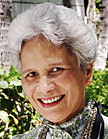
Hawai‘i Maoli
Dr. Hughes is the first Native Hawaiian to become a registered dietitian, as well as public health nutritionist. During her professional career she became a tireless advocate of health programs for the Hawai‘i and the Hawaiian community.
Hawai‘i Maoli, is a 503(c)3, non-profit organization, founded in 1997, by the Association of Hawaiian Civic Clubs. Hawai‘i Maoli’s mission is to “provide day-to-day services to the membership clubs, councils and associations, through which we serve Native Hawaiians and the general public.” The Association of Hawaiian Civic Clubs is comprised of five clubs throughout Hawai‘i, as well as in the states of Alaska, California, Colorado, Nevada and Washington, D.C.
The Hawaiian Civic Clubs is the oldest community-based, grassroots, Native Hawaiian organization that was founded by Prince Jonah Kūhiō Kalaniana‘ole in 1918. The Association of Hawaiian Civic Clubs has paid close attention to issues of health and wellness of Native Hawaiians, recognizing that its members are disproportionately affected by health disparities. Comprehensive health screenings and preventive- health education are provided to members and families at the annual convention of the Association. These services include diabetes, cancer, and cardiovascular disease health education and screening.
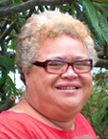
Kula No Nā Po‘e Hawai‘i
Ms. Kekauoha currently serves as health committee chair of the State Council of Hawaiian Homestead Associations.
Kula No Nā Po‘e Hawai‘i (Kula) is a non-profit organization established in 1992 to improve the educational skills of area children. Kula serves the Hawaiian Homes communities of Papakōlea, Kewalo, and Kalawahine streamside, a community of 1,575 residents.
Since 1992, Kula has broadened their vision to include health initiatives. Programs and services provided include youth based programs, traditional Hawaiian health classes, literacy and health fairs. In 2003, concerned community leaders and residents developed and implemented Hō‘ola Pono O Papakōlea, a program which includes lomi lomi (Hawaiian therapeutic massage) training and services, health screening for diabetes and cardiovascular disease risk factors and health education counseling.

Ke Ola Mamo
Dr. Palakiko is a health administrator with Ke Ola Mamo. At KOM, she oversees the development, implementation and evaluation of health services and research activities.
Ke Ola Mamo (KOM) is a private, non-profit Native Hawaiian Health Care System for the island of O‘ahu. Established in 1992 to address the health disparities of Native Hawaiians, KOM provides services primarily to low income Native Hawaiians through community outreach, health education and prevention/wellness programs such as Ho‘oikaika (fitness and nutrition) Program.
KOM has more than 15 years experience of implementing health promotion and disease prevention education programs such as the Diabetes, Cancer, Heart Disease, and obesity. KOM is one of the founding partners of PILI ‘Ohana Project and has over 10 years of conducting community-based research.

Kokua Kalihi Valley
Ms. Yoshimura is an effective project manager and registered dietitian.
Kokua Kalihi Valley Comprehensive Family Services (KKV) is a community owned and operated non-profit corporation established in 1972 by community and church leaders with social service representatives to address the lack of adequate and accessible health services in their community.
Primary health care and dental services are provided to a primarily Pacific Peoples and immigrant Asian population. In 2006, KKV provided services to 7,813 individuals.
KKV has over 35 years of delivering health care to the community. In 2003, KKV received a Robert Wood Foundation award to implement "Active Living by Design", a project focused on increasing physical activity through community mobilization.